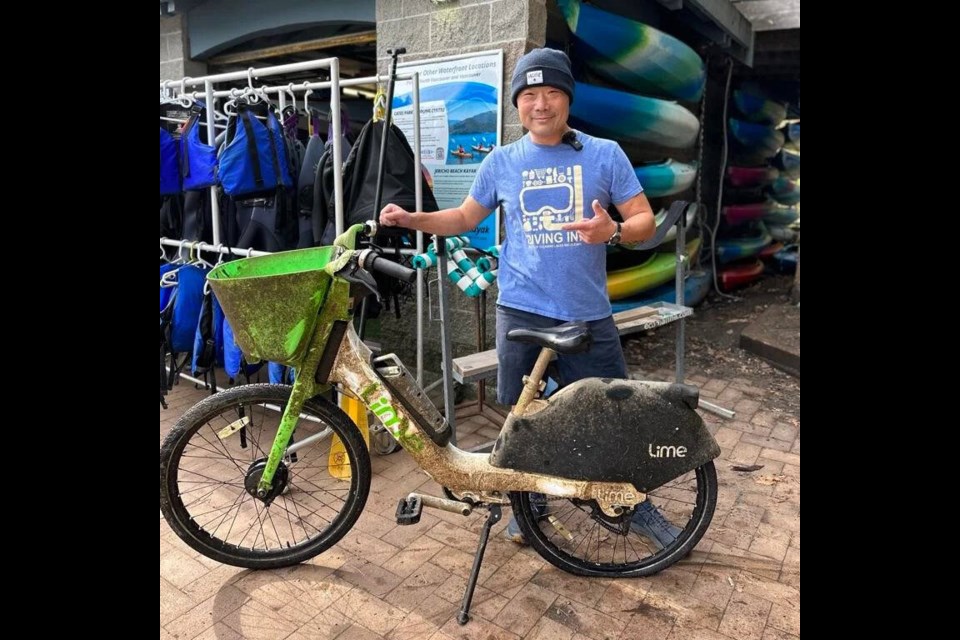When Henry Wang ran into a guy who was travelling across Canada, picking up trash from various bodies of water along the way, the numbers didn’t hold much weight.
“I kind of laughed, and I went, ‘98 pounds in 99 dives, really?’” Wang said.
A seasoned diver and North Vancouver resident, Wang knew a place where he thought there was probably some junk below the surface.
“So we went to Deep Cove government dock, and we pulled up 1,300 pounds in one day,” Wang said. That dive in 2013 would be the first of 246 clean ups organized by Wang in the following decade, for a total of 58,341 pounds (26,463 kilograms) of garbage removed.
As part of his Divers for Cleaner Lakes and Oceans organization, Wang, along with friends and other volunteers, have amassed a mountain of rubbish from sites including Lonsdale Quay, Fishermen’s Pier in West Vancouver, Cat Lake near Squamish, Sasamat Lake in Port Moody and Sayres Lake near Mission.
As it’s the place where the journey began, Deep Cove was a fitting location for the outfit’s 10th anniversary. It’s also the place with the most interesting trash.
On Sept. 23, Wang dove back into the familiar waters along with a dozen other scuba divers and freedivers. They pulled out cellphones, a drone, sunglasses, rope, socks, sweaters, tires, a car battery, a fire extinguisher, boat anchors and a Lime bike.
None of these finds surprised Wang.
While many of the items are unintended deposits, much of Deep Cove’s collection is curated.
“Kids like to just throw things into the ocean,” he said. “The very first year we found a parking bollard … the kids managed to pull that out of the ground and carry it all the way down to the dock and then huck it in.”
“The next year we recovered an aluminum park bench that they had to unbolt somewhere up the hill – I don’t know where – and carry it down a really long way. Like it’s a huge amount of effort to huck that in the ocean,” Wang said.
Returning the sunken Lime bike required some effort too.
Lime’s website has forms to fill out problems with a rental or to report a broken bike, “but there was no option to say, ‘Hey, I found your bike in the bottom of an ocean,’” Wang explained.
So he took to social media, posting videos tagging Lime and North Vancouver District, who organizes the bike-share program. After some back and forth, someone from Lime finally came to retrieve the soggy bike.
Trash recovery presents experienced divers with interesting challenges
Wang’s self-described “weird hobby” of underwater trash collection emerged from a state of having ticked every box on his diving list.
He formerly owned The Edge Diving Centre in North Van, but sold it in 2013. Wang has done a lot of diving around the world, reaching the highest level of cave diving certification and being qualified to dive to extreme depths with a rebreather, an advanced device which recycles a diver’s air.
“I’ve pretty much accomplished everything that I want to do in diving,” Wang said. “If it wasn’t for the interesting aspect of diving for trash, never really knowing what I’m going to find, I wouldn’t dive anymore.
“How often can I go to Whytecliff diving, seeing the same fish over and over again?” he said.
Apart from novelty, hauling miscellaneous hunks of junk out of the water presents interesting challenges in problem solving. “If I encounter 500 tires at Albert Dyck Lake in Abbotsford, how do I get those out? You have to create solutions.”
In this case, Wang and his team engineered a continuous loop of rope from the bottom to kayaks on top of the water. Freedivers would guide the tires attached to the rope by carabiners to the surface, then let the empty carabiners loop back to the bottom.
“It was a conveyor belt of tires,” Wang said. “We got 55 tires out that day … If I was doing that on my own, I would have gotten maybe five or six.”
While donating innumerable hours to clean up local lakes and ocean is clearly a laudable endeavour, Wang has never thought to push any morals onto would-be litterers.
“I’m pulling stuff out of the water – take whatever message you want to get out of it,” he said. “I’m never going to convince the people who maliciously pollute.”
What has left an impression on Wang are some of people’s own clean up stories that they share online.
One time, a guy posted his experience of finding a 50-gallon oil barrel while camping in a remote area. In his post, the camper wrote that he was just going to leave it, at first. “But then it occurred to him how much effort it takes for me to get trash out of the water. And he said, ‘Screw it,’ and ended up carrying this thing a kilometre through the bush back to his camp to get it out of the environment,” Wang said.
After 10 years of diving the depths for detritus, Wang isn’t trying to convince anyone to take action.
“But the people who have taken extraordinary efforts to remove things because they’ve seen one of my pictures or videos … I’m so grateful for those guys.”



